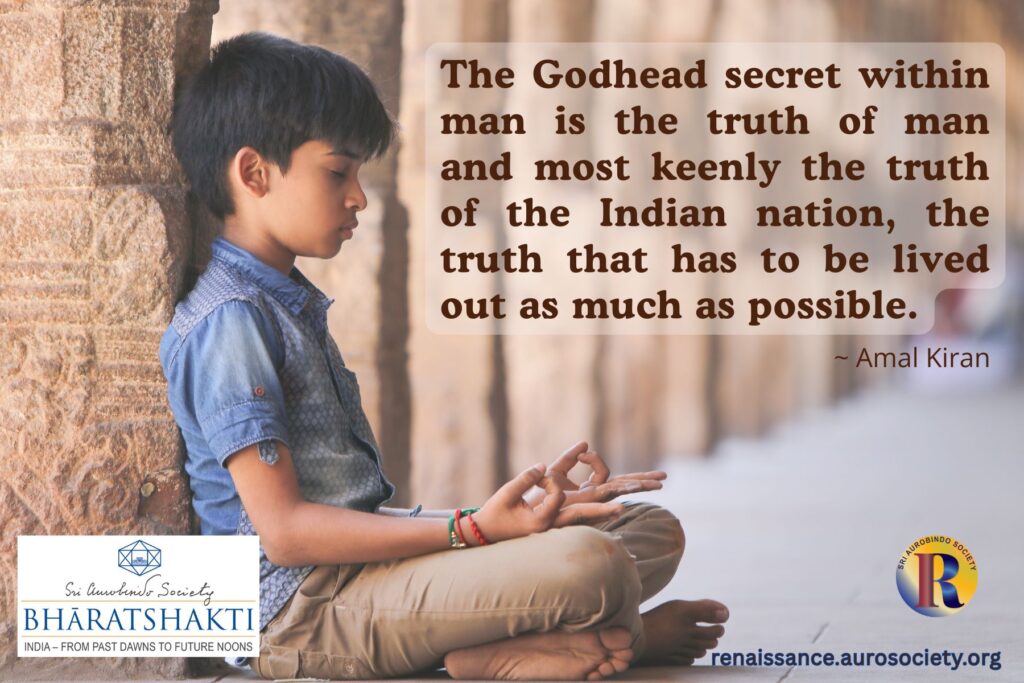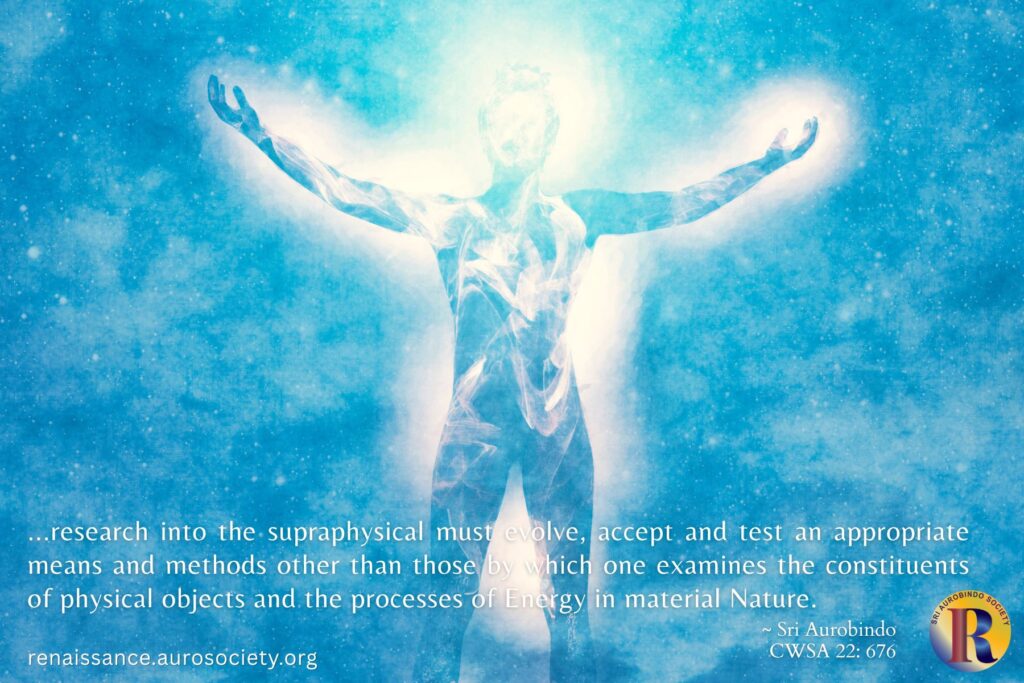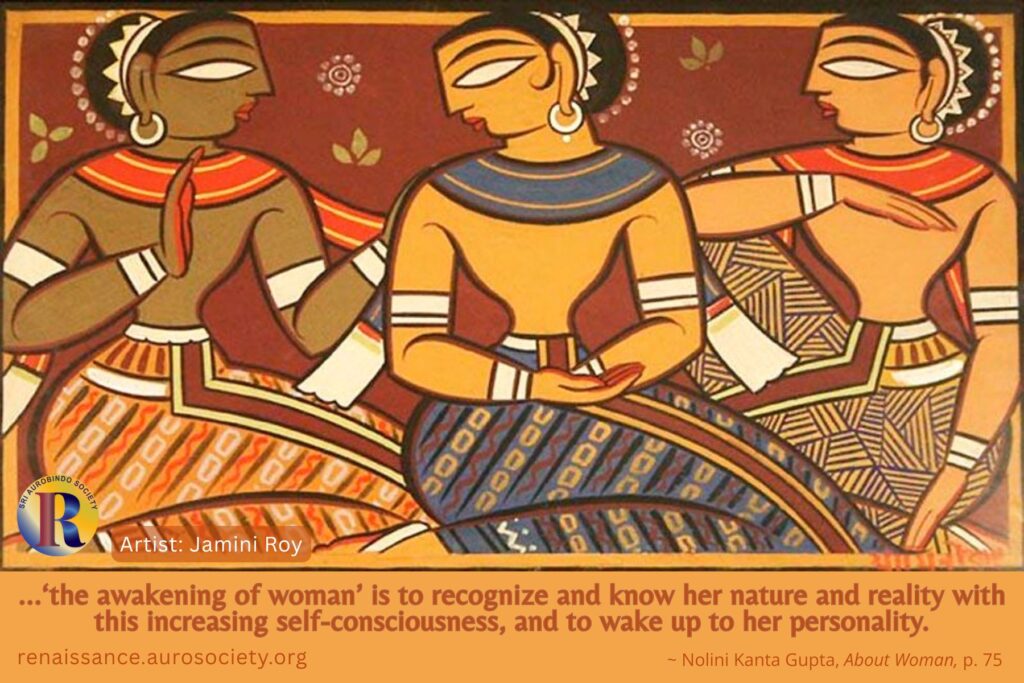Editor’s note: We feature a review of M. V. Seetharaman’s book titled, ‘Studies in Sri Aurobindo’s Dramatic Poems’. This book of 99 pages published by Annamalai University in 1964 carries a Foreword by Dr. C. P. Ramaswami Aiyar, then Vice Chancellor of Annamalai University.
This review by Ravindra Khanna was first published in April 1966 issue of Sri Aurobindo Ashram journal Mother India: Monthly Review of Culture, Vol. XVIII, no. 3 (pp. 49-52). We have updated the references and made a few minor formatting revisions for this digital presentation.

The world is familiar with Sri Aurobindo’s name as the master of Integral Yoga, the exponent of the spiritual significances embedded in the esoteric verses of the Veda, Upanishad and Gita, or the writer of a luminous spiritual poetry of his own. But it is somewhat of an enigma that he should be the author of plays which have no easily discoverable spiritual message and aim at rendering life with all its clashes and jostlings, burning passions, voluptuous luxuries and huge ambitions such as reach out beyond the earth.
No doubt, we must not forget that his is not a world-shunning etiolated spirituality but one which sees life too as “a power of the Divine and not a creation of some malignant Chance or dark Titanic impulse” (CWSA, Vol. 23, p. 172). And yet it is not life as it is that he accepts in his yoga. As he remarks,
Life is indispensable to the completeness of the creative spiritual realisation, but life released, transformed, uplifted. . .
~ CWSA, Vol. 23, p. 173
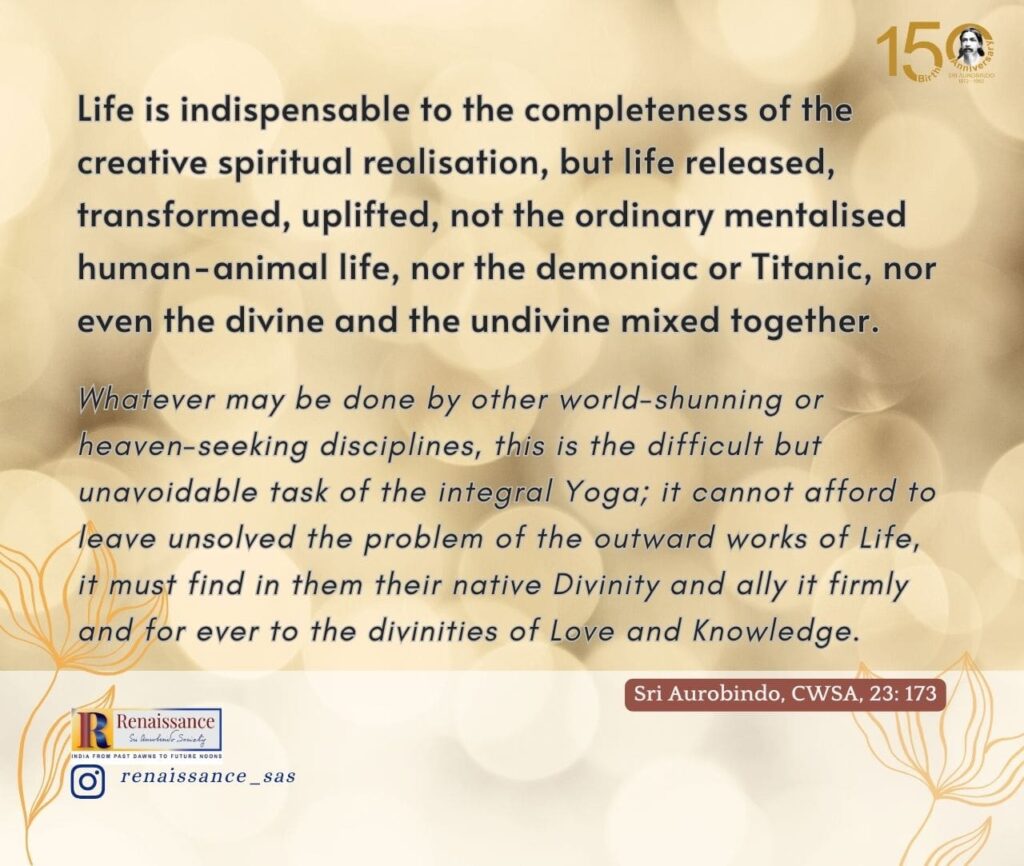
What then is the justification for these plays with the stage set in places like Syria, Baghdad and Bassora, ancient India, and the snow-bound regions of Norway?
Well, here is what Sri Aurobindo says:
Your life on this earth is a divine poem that you are translating into earthly language or a strain of music which you are rendering into words.
~ CWSA, Vol. 12, p. 100
What could be a better rendering of this divine poem than poetic drama which takes life in all its richness, power and complexity? And it not only invests it with the Light that never was on sea or land, but also reveals the hidden direction behind its wayward and straggling flow, discovers for us the laws of the inner growth of the psyche towards wisdom, love, beauty and strength.
M. V. Seetharaman brings to his work his deep knowledge of Sri Aurobindo’s all-comprehending spiritual gospel and of his views on the nature of poetry in general and poetic drama in particular. The conditions of success of a poetic drama are exacting to an extreme degree. That’s why Sri Aurobindo could say of the creators of dramatic poetry :
. . . the entire literature of the world has hardly given us more than a dozen. The difficult evolution of dramatic poetry is always more hard to lead than the lyric which is poetry’s native expression, or than the narrative which is its simpler expansion.
~ CWSA, Vol. 26, p. 75
Seetharaman unfolds the inner significance of each of the five plays — Rodogune, The Viziers of Bassora, Perseus the Deliverer, Vasavadutta and Eric. He gives us ‘the interpretative vision’ that ensouls each play and imperceptibly emerges from it.
Rodogune is a highly sustained tragedy without any comic or tragic relief lightening the sombre gloom cast by ‘some cold ironic god.’ And yet, as the author remarks, “it is a poetic play and is typically Aurobindonian in its vision of life, characterization and atmosphere. It is a tragedy of fate working through the passions of human beings and therefore presents the ‘mysterium tremendum’ of life in this world.
But the sufferings of men and women in the play are shown to be purposive and serve evolution of the souls of these human beings. Behind the passions we see the divine element or, as Eunice puts it, “. . . the divinity that sits in man . . . the power Unnameable that struggles with its world” (CWSA, Vol. 3, p. 189).
Thus Antiochus, the tragic hero full of hubris, comes to the realization that the gods break only “a body, not this soul; for that belongs, I feel, to other masters.” (CWSA, Vol. 3, p. 289) And Rodogune, the heroine, always strives to make life sweet:
By outward harmony with circumstance
~ CWSA, Vol. 3, p, 208
And a calm soul within that is above
My Fortunes.
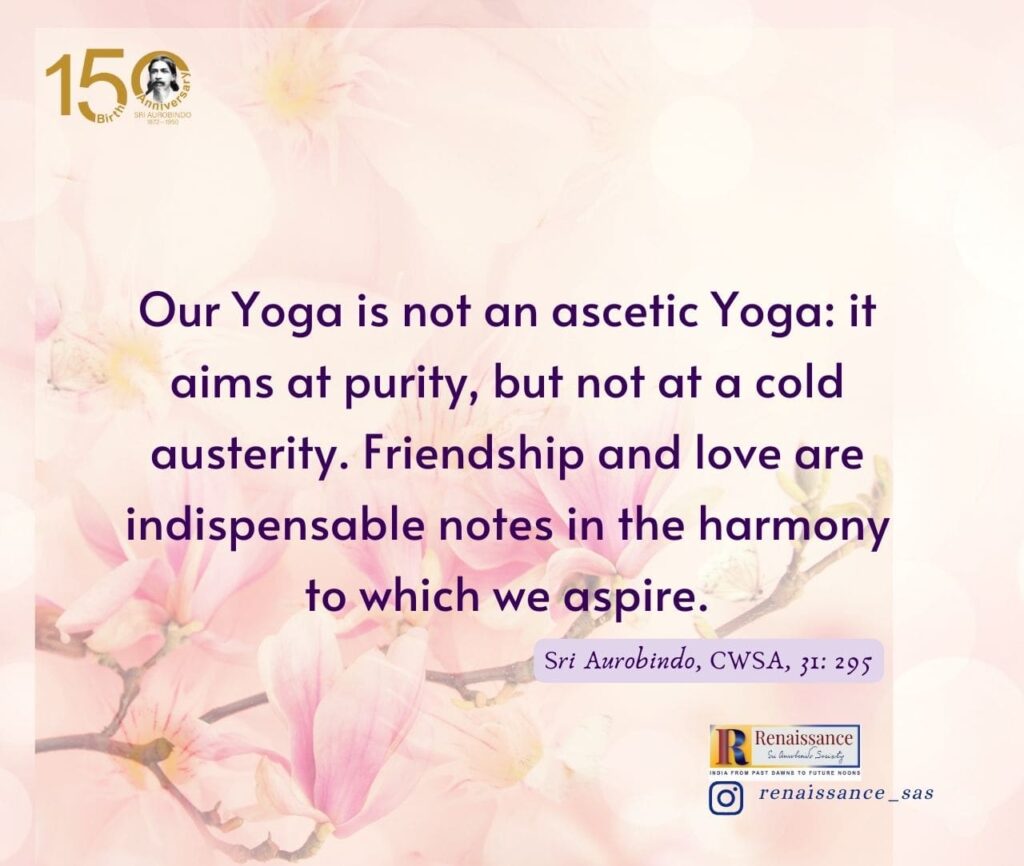
The author has perused each play not only with a view to extracting its hidden meaning but with an alert imaginative vision responding sensitively to the stage effect. Thus he closes his appreciation of Rodogune with these words:
“The sensitive spectator of the play sees all, undergoes all by imaginative identification with the life (individual and collective) in the drama. He experiences with Cleopatra, Phayllus and their similars the variations on the same theme of Egoism. But he breathes simultaneously in the ‘ampler ether’, the ‘diviner air’ of the spiritual, psychic and subliminal with Eremite, Rodogune and Antiochus.
“And the result is a strange alchemy purification of his consciousness, citta suddhi. He feels ‘the touch of tears in mortal things’ but feels also the Divine Master shaping the human flute and making it perfect to breathe through it melodies eternally new’. To him is the Peace Eternal, Shanti Shaswati.”
The author’s treatment of The Viziers of Bassora, a romantic comedy redolent of the enchanting stories of the Arabian Nights and the Caliph Haroun-al-Rashid ‘whose name has acquired a magical halo and mythical significance around it,’ combines very deftly perspicacity with imaginative sympathy and insight into each one of the characters. Some of these characters are villainous, self-centred and full of dark machinations against those ‘made in God’s image and growing more in that image of Love, Light and Grace’.
As a specimen we shall quote his summing up of the character of Ibn Sawy, the good Vizier: “Just he is, but powerful he is not. A faithful and sincere instrument he could be, but not an originative force.”
Love being the presiding deity of the play, the women characters are most deserving of study. As the author observes:
“To inspire love by their beauty of form and character in those who are capable of it is the great privilege of the women in the play who are all of them made in God’s image and grow increasingly in that image.
“The love they bestow on men and on each other draws out the best in all and acts for harmony, sweetness and right… their robust optimism and essential cheerfulness of outlook on life living in the present with full trust in the power of the life-force to disentangle the complications it has got into are contagious and help ease the gloom and murky darkness of life. They could laugh at the incongruities of life and make the men laugh with them and become sane and wise.”
“Love”, as the author observes, “invokes a greater power than evil to intervene in a world of darkness and evil and that power responds and even rushes with all its puissance and restores the rotten society and gives it a new birth in love and maturity.”
On the songs sung by Anice, the heroine, the author comments :
“All of them emerge in situations of intense feeling and emotional exaltation when the speaker is liberated from the bondage of her cramping personal self, and voices some great universal idea whose full value even she may not have realized at the moment. Their themes are Love, Life and God.”
In the end there is a very remarkable comparison with Shakespeare who, according to the author, “started with the idea of the comedy of the Middle Ages but depleted it of its religious atmosphere. His plays are characterized by the absence of religion. They have more of the Renaissance humanism and zest for life.”
But The Viziers, says the author, “presents in bold relief characters with a well-defined mental love for God and acceptance of His will. They could say in the great crises of their lives the great words of Dante, ‘In His will is our peace’ . . . This romantic comedy is the declaration of the soul of the creative artist of Faith in the supreme Architect of life and His master-plan of ultimate victory and triumph over Matter”.
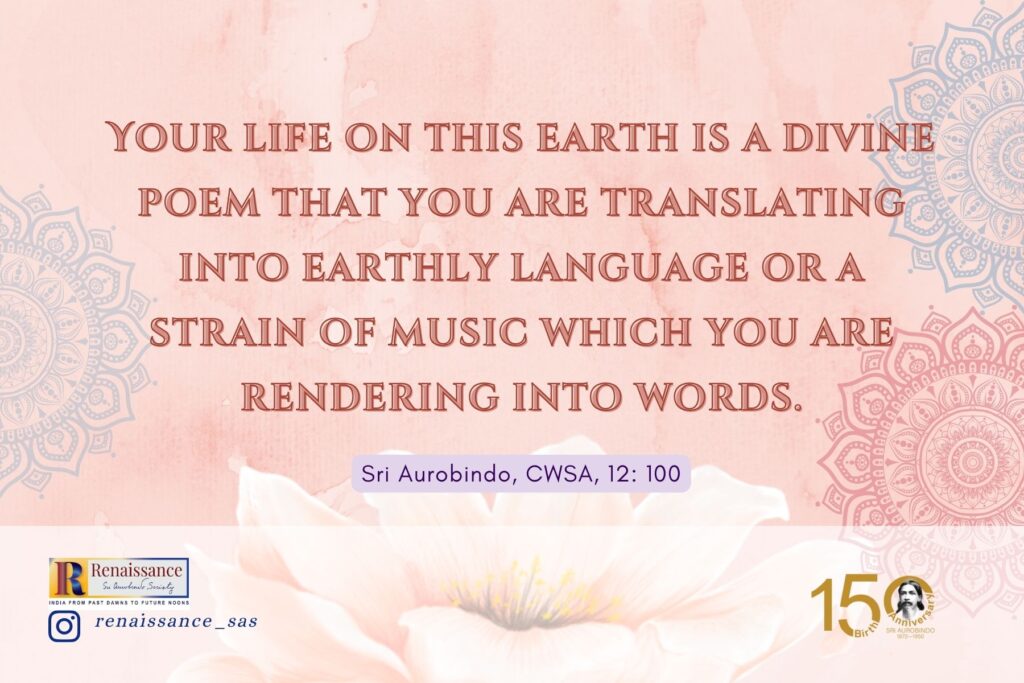
The third play is Sri Aurobindo’s Perseus the Deliverer. This play, according to the author, “embodies Sri Aurobindo’s vision of cosmic evolution from a state of crude and evil religion based on fear and division and violent cruelty presided over by an Undivine and even Anti-divine occult power to the condition of a pure and refined worship of a divine light, a compassionate, calm and benignant Force with its law of love and union in relationship with and mastery over the forces of Nature”.
This play, in the hands of Sri Aurobindo, is the richest in symbolic overtones of revolutionary epochs when great souls descend on earth, alike divine and diabolic, and align themselves either as instruments of the progressive forces or on the side of the forces of retrogression.
Seetharaman has analysed each character in detail separately. He assigns it its role in the great symphony and thus is how in a few pregnant phrases and bold strokes he presents to us the whole pageant of characters.
“The amorphous and the heterogeneous, the conservative and the deeply rooted, the transitional and the halfway-housed, the revolutionary and the already new-born, the uprooted and the sceptical, the witty and the humorous and the eternally and spontaneously childlike are depicted with remarkable individuality and characteristic mutual responses and orientations to the coming light.”
In the same manner the author deals with Vasavadutta. This is an Indian romance of ancient times when the Indian political and cultural life was richly spangled with small kingdoms each developing its own artistic and social traditions vying with rival states for influence and prestige.
This play, according to the author, is “a Dramatic Romance of the Psychicised life-spirit evolving, growing and maturing in this world of earth consciousness guided by the twin values of Love and Beauty and realizing the Delight of Existence, ānanda“.
Last in the series is the Norwegian play Eric. The author’s introductory note to the play is a masterly exposition of the true nature of poetic drama. In it there is always behind the clash of forces a pressure of the new and higher values of life to emerge and take firm root and usher in a new era of life.
“An awareness,” says the author, “of this world of values enveloping all movements and a communication through all the resources of language of this vision of values working themselves out in and through the forces and characters, constitute the essence of poetic Drama.”
This recalls to our minds Sri Aurobindo’s own words on the subject, unique in their revelatory power in his book The Future Poetry:
. . . drama is the poet’s vision of some part of the world-act in the life of the human soul, it is in a way his vision of Karma, in an extended and very flexible sense of the word; and at its highest point it becomes a poetic rendering or illustration of the Aeschylean drasanti pathein, “the doer shall feel the effect of his act,” in an inner as well as an outer, a happy no less than an austere significance, whether that effect be represented as psychological or vital, whether it comes to its own through sorrow and calamity, ends in a judgment by laughter or finds an escape into beauty and joy, whether the presentation be tragic or comic or tragi-comic or idyllic.
~ CWSA, Vol. 26, p. 75
This slim volume has a very lucid foreword by Dr. C. P. Ramaswami Aiyar, Vice-Chancellor of Annamalai University. It is bound to prove of great value to the students of these plays which are sure to gain more and more attention in India and abroad containing as they do poetic speeches of rare beauty, power and majesty. We whole-heartedly congratulate Annamalai University for this venture. And we hope it will stimulate more and more interest in these plays.
Read more of Mother India Archives HERE.

~ Design: Beloo Mehra

